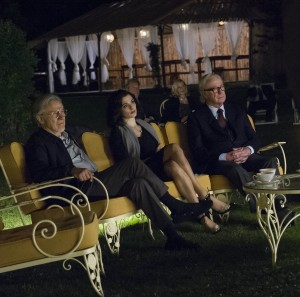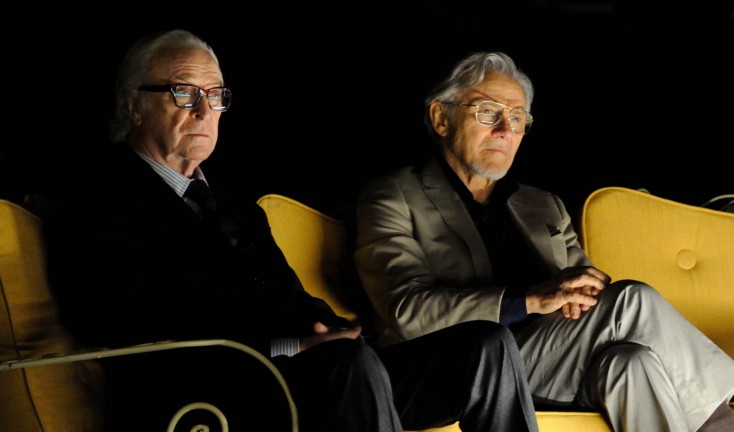
(l-r) Harvey Keitel as “Mick,” Rachel Weisz as “Lena” and Michael Caine as “Fred” in YOUTH. ©20th Century Fox. CR: Gianni Fiorito.
By ANGELA DAWSON
Front Row Features
HOLLYWOOD—Michael Caine and Harvey Keitel play lifelong friends who feud over a woman they both loved years earlier in the heartfelt dramedy “Youth.”
Oscar winner Caine (“Hannah and Her Sisters,” “The Cider House Rules”) plays Mick, a retired composer/conductor, who wants nothing more than to be appreciated for something other than a work called “Simple Songs,” which he regards in his twilight years with disdain. Meantime, his friend, Fred (Keitel), a Hollywood filmmaker, struggles with a screenplay he and his team is writing, and a diva that can make or break the project. The two are holed up at an alpine health spa, along with Mick’s dutiful daughter, Lena (Oscar winner Rachel Weisz, “The Constant Gardener”), who is trying to convince her father to accept an invitation to perform his classic work for Queen Elizabeth II. With reflections on regret, aging, grudges and, of course, lost youth, the film is written and directed by Italian filmmaker Paolo Sorrentino (“The Great Beauty,” “Il Divo”).
The veteran actors (Londoner Caine is 82; Brooklyn-born Keitel is 76), with nearly 100 years of professional experience between them, had a fun time getting to play friends, even though they had never previously worked together, as well as the meaning of art and working with Sorrentino.
Q: Michael, Paolo wrote this role specifically for you. Can you tell us the experience of getting this role and actually working with Paolo?
Caine: Receiving the role was an absolute surprise because I’d seen everything Paolo had done, though not intentionally. I saw “The Great Beauty,” and then it won the Academy Award (in 2014) for the best foreign language film. My agent rang me and said, “We’ve got a script for you from Paolo Sorrentino.” I was amazed that he’d heard of me because we didn’t seem to be in the same sphere. She said, “He’s written it for you,” and I went, “Really?” And she said, ”If you don’t do it, he won’t do the movie.” So, I said, “All right, I’ll do the movie.”
Q: One of the most spectacular moments of the film is when you conduct a 120-piece orchestra. What was that experience like?
Caine: It was four weeks of hard work, really. We had two great conductors who taught me who were so wonderful to me. They were absolutely fabulous. I just saw Sumi Jo (an opera singer who performs in the film) in the corridor. She told me that I was a good conductor, so I feel good.
Q: Harvey, you actually sought out Paolo to be in this film because you are a big fan of “The Great Beauty.” Why did you so want to work with Paolo?
Keitel: My story is somewhat similar to Michael’s. I was stunned, also, NOT to be offered the part. (He laughs.)
Caine: I asked Paolo who he wrote it for, and he said, “I wrote it for two of you, but the other one was busy.”
Keitel: Paolo offered it to two other actors, but I had Joe Pesci kill them both. They didn’t want it, and here I am.
Q: You’ve worked with great directors including Quentin Tarantino, Jane Campion and Martin Scorsese. What was it about working with Paolo Sorrentino like?
Keitel: Having seen his work and reading the themes he wrote about in “Youth,” were just so touching and reflected the way I was thinking about my own life. The friendships I had as a youth growing up in Brooklyn, and how important they were to me, to my survival growing up and what its underlying currents of betrayal and loyalty and fear of the truth mean in developing real friendship—Paolo wrote about all these themes in the film.
Q: The theme of overcoming fear, which your character does, is the key to “Youth.”
Keitel: The characters fare very well at the end because of what Paolo wrote about friendship. My character says something about how friendship is so long and good because we never talk about the bad things, only the good things. The way Paolo wrote the story, it shows you what that leads to. So I think they do fair well in terms of the story.
Q: What does it lead to?
Keitel: Be very mindful of your own reasons for having a friendship. Try to be as truthful a person as you can be, have the courage to be.
Q: What was it like to have that six-minute onscreen argument with Jane Fonda, who plays an actress who hates you?
Keitel: Well, Jane is a diva. I mean that in a good sense.
Caine: She’s an icon.
Keitel: More importantly, that’s another scene that manifests this theme of friendship and how dangerous it can be if it’s not honest and about loyalty and betrayal, and what it can do to a person if you can’t find the courage to be honest with yourself, and can’t be honest with another person. You know the results of what happens in that scene. So it was a very powerful one in terms of the theme of the movie.
Q: The film deals with so many different kinds of art – acting, music, writing and storytelling—so did making the film change any of your views on art?
Caine: By the time I was working with Paolo, I thought art must be available to everybody. Paolo is such a great artist. There are things I learned in it. At one point, my character says, “I’m at my doctor’s, and the doctor says to me, ‘How do you feel about getting old?; and I say, ‘I don’t understand how I got here.’” That applies to me, personally. I don’t understand it. About two years ago, I was 35, and suddenly, I’m 83, and I’m going, “What the **** happened?”
Keitel: I got all my ideas about art from Jerry Lewis, from a skit he once did. H was playing Romeo, and the actress who was playing Juliet, came out onto the porch, and said, “Romeo, Romeo, wherefore art thou?” and Jerry Lewis says, “I art right here.” That was always my idea of art. (He chuckles.)
Q: Is there a history between the two of you? How do you know each other? Do you consider each other friends?
Keitel: I can say that I wanted to be like Michael when I first saw his early films. He’s one of those actors that set a standard of the work for all actors. So, I felt that way back then, although we hadn’t met before this film.
Caine: He never told me that.
Q: Michael, you’re from England; Harvey’s from Brooklyn. You’ve never before worked together. What do you have in common?
Caine: We had a fortunate thing for a start is that we’re both ex-soldiers, and that makes for an instant bond on a certain level.
Keitel: I was a Marine.
Caine: A Marine is a soldier. That’s why I said soldiers. I was in the British Army. As soldiers, you just know certain things that no one else knows, and that’s the end of that. That started our friendship. He’s a very nice man, and I’m a very nice man, and we became friends. He’s a fabulous actor, and I’m nearly as good as he is. (He laughs.)
Q: Paolo is known as a hands-off director who gives you very little direction. What was that like?
Caine: It was great to work with him because he is not performing himself; he’s just looking. Sometimes you get these directors who are not very efficient. They become directors, and they think they’re supposed to do what they’ve seen in a movie, like when a director shouts something appalling. Paolo’s very quiet and knows exactly what he wants and knows exactly when he’s not getting it.
(Legendary filmmaker) John Huston never gave me a direction and I asked him why. He said, “You get paid a great deal of money to do this. You don’t need me to tell you what to do.” And then I asked him, “What’s the art of directing?” and he said, “Casting.” If you cast it right, you don’t have to say anything.
Q: Did Paolo allow you to improvise some of the scenes?
Keitel: There were moments he did that but mostly in rehearsal. He allowed me to improvise with him and the other actors. There was one moment I might have improvised some things, and Jane (Fonda) helped me in one thing we did. There was a little bit of that, but Paolo’s writing is so precise and vulnerable that it was easy to come to it.
Caine: I never ad-libbed anything. I just did the words. I mean you’re lucky to get away with that.
Q: Michael, you and Rachel Weisz, who plays your daughter share the same bedroom. Can you talk a little bit about that?
Caine: I didn’t dare analyze it. I just kept over my side, my back to her, and she kept to her side. I’ve got two daughters. We’ve never slept together in any way. It’s beyond the pale for me. My thought behind these characters as that when she was little she slept with her dad after her mum died, and that must have continued into adulthood for her.
Q: This film is set at a chilly alpine spa. What kind of environment do you go to to relax?
Caine: I go to the sunshine always. In “The Man Who Would Be King,” I played a guy called Peachy and someone says, “Just tell him Peachy’s gone south for the winter.” That sums me up. I hate the cold. I don’t want to go skiing. Everybody I see who goes skiing, comes back with their arm in a sling.
Keitel: I love cold weather; it relaxes me.
Q: Do you have your own version of “Simple Songs?” Something that people always talk to you about, but you would rather talk about something else you’ve done?
Caine: Yeah, I don’t like people that bring up flop films that you’ve made, because it’s sort of unkind. You didn’t know they were a flop when you were going in. They don’t give you a chance at failure. You’ve got to be a success every time.
Keitel: I like when people ask me about any film I’ve done because I feel the film speaks stronger than I can speak for the film. The pleasure is in the work is creating the work. You know you’ve found the truth of that moment is enough satisfaction for me, especially in “Youth.” If you asked me about a Dostoevsky novel, I’d say, “Read it.” So, you ask me about this film, I would say, “Watch ‘Youth.” It can tell you all about everything that I think you have questions about.”
Caine: Sometimes when people ask me what it’s about, I say, “It’s about an hour and 50 minutes.” (He laughs.)
Keitel: Can I just say one more thing, because I didn’t explain it well enough and I don’t want to be misunderstood. What I meant is I like talking to people about the story. I just don’t like being put on the spot to say what the film is about. Our pleasure is in creating the story so we can talk about it. The reason why we go to the theater is so we can discuss those obstacles and those problems.





